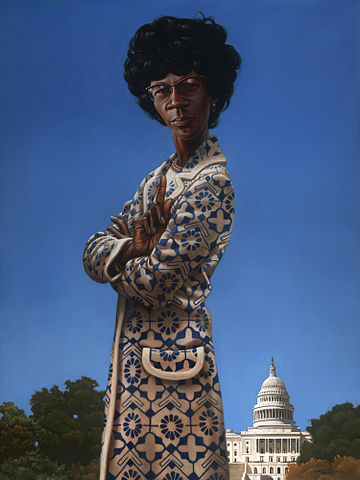Error of omission: the Honorable Shirley Chisholm
Can we all just blame overwork for the glaring omission I recognized after the blog posted on Saturday? I opened the blog with the great Bella Abzug’s penchant for wearing hats—her way of distinguishing herself as a professional. And I segued from there into a discussion of one of the sessions at the Smith College Women’s Leadership Conference, where a white woman talked about being asked, on more than one occasion, “How can you be an engineer?”
So far, so good.
In the second part of the post, I talked about unconscious bias and the thought-provoking presentation Aziza Jones made about how women of color—and allies like me—can support more diverse leadership.

By Kadir Nelson – photo, Public Domain
It’s a fine post. But it could have been better. No matter what the second half of the post had been about, I should have balanced it with an Abzug-like example. In this case, since it was about women of color in leadership, there’s a perfect counterpart to Abzug: the woman she joined in the New York Congressional delegation, the Honorable Shirley Chisholm.
I thought about editing Saturday’s post, but I didn’t want to sneak Representative Chisholm in the back door. We’ll give her the stage all to herself.
Shirley Chisholm, truth-teller
In 1968, Chisholm became the first black woman ever elected to Congress. She recognized exactly what that milestone meant, and she wasn’t afraid to tell the truth, however uncomfortable it might be:
I wrote about Abzug because she adopted a costume to overcome the unconscious bias directed at her. But of course, people of color can’t just slap on a hat and establish themselves as professionals. Unconscious —and sometimes conscious—bias causes some white people to “read” them as waiters when they’re dining in restaurants, as salespeople when they’re shopping, as invisible (except when they’re perceived as menacing).
And let’s not forget the many ways people today disrespect the women of color in power. Case in point: serial sexual harrasser Bill O’Reilly dismissed substantive comments on the House floor by Rep. Maxine Waters, saying he was distracted by her “James Brown wig.” So Waters wears straight hair; I recently heard a black professional say she was told not to straighten her hair because it made her seem like she was trying to “look white.” Straight, natural, braided—it’s not about the hair, clearly. It’s about the power these women wield.
The white men in power tried to sideline Shirley Chisholm, too. But they didn’t know what they were getting into. Chisholm represented an urban district, in Brooklyn, so of course the House leadership put her on the Agricultural Committee. At first she was angry about this, but she later saw that she could use her position to expand the food stamp program. So she did. She was one of the driving forces behind the creation of the WIC program—supplemental nutrition for Women, Infants, and Children.
“Shirley Chisholm had guts”
In 1972, Chisholm racked up another first—becoming the first Democratic woman to run for President. Yes—of the United States. She was also the first black person from either major party to run. But she always said she felt more discriminated against for her gender than for her race. From her The New York Times obituary in 2005:
“I’ve always met more discrimination being a woman than being black,” she told The Associated Press in December 1982, shortly before she left Washington to teach at Mount Holyoke College in Massachusetts. “When I ran for the Congress, when I ran for president, I met more discrimination as a woman than for being black. Men are men.”
I’m not here to parse degrees of discrimination. All people deserve equal respect and opportunity; that we still haven’t figured out how to do that after living together for thousands of years is unconscionable.
But let’s remember Shirley Chisholm as she herself wanted to be remembered— not as “the first black woman congressman,” but as a courageous leader:
“I’d like them to say that Shirley Chisholm had guts.”
Want to communicate more courageously? Click here to get my e-book Do It Anyway: Tips for Courageous Writing